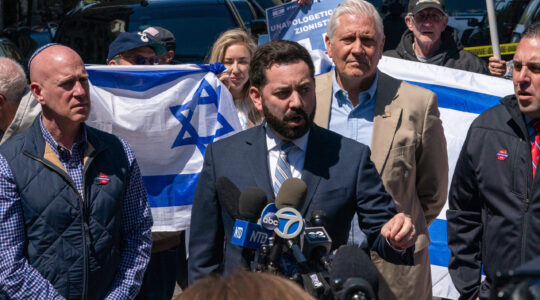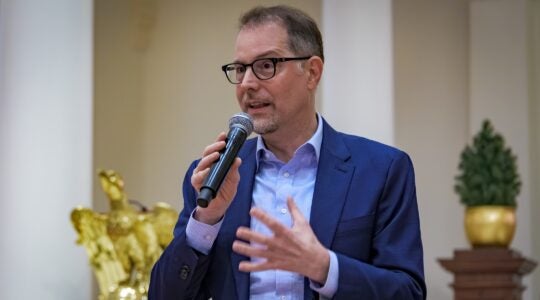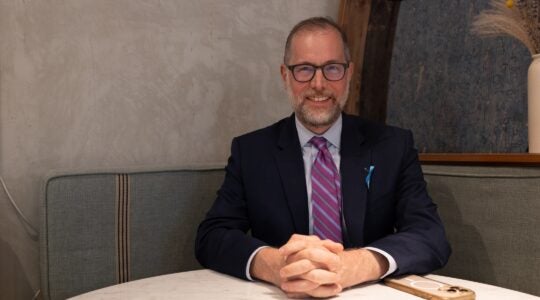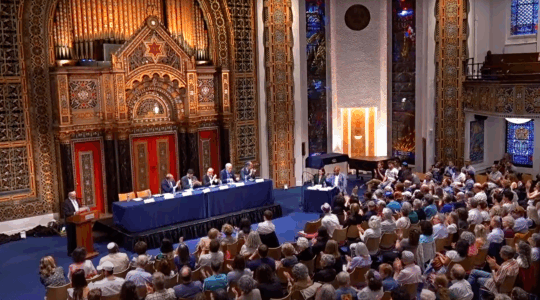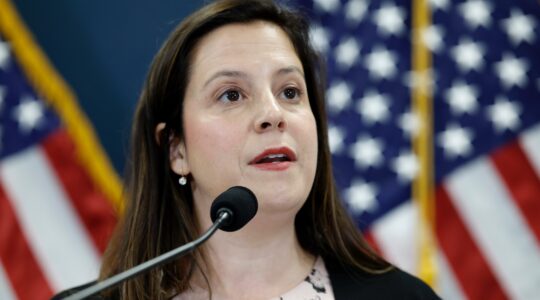WASHINGTON (JTA) — Left-wing advocates of a two-state solution and a greater U.S. role in the peace process are joining forces in support of what they hope will be a groundbreaking conference this October in Washington.
The conference, set for Oct. 25-28, is being dubbed as J Street’s first national convention, but 11 other groups have signed on as “participating organizations,” including Ameinu, Americans for Peace Now, the Israel Policy Forum, the New Israel Fund and Brit Tzedek v’Shalom.
The plan is for these other organizations to help promote and recruit for the event, in addition to having input on the program and helping to “shape the conference,” said J Street chief of staff Rachel Lerner.
The push for greater cooperation comes as many organizations on the Jewish left are reveling in what they view as a major shift in Washington, with the White House and members of Congress endorsing some of the policy prescriptions that they’ve been backing for years.
In particular, several of the organizations involved in the upcoming conference have been offering strong public support for the Obama administration’s push for an Israeli settlement freeze. Two of the groups — J Street and Americans for Peace Now — found themselves on the list of 14 organizations invited to Monday’s meeting in the White House with the president.
Some lawmakers and congressional staffers say that the increased profile of liberal groups is starting to have an impact on Capitol Hill. One staffer said that while there have always been members of Congress who have been on the left side of the pro-Israel spectrum, now those lawmakers have “a safe place” to remain “pro-Israel” while openly discussing more sensitive issues like the humanitarian crises in Gaza and the failure to establish a Palestinian state.
J Street’s executive director, Jeremy Ben-Ami, said that one of the goals of the conference was to show people in Washington that it “isn’t just 10 people gathering in a basement” who support these views. Similarly, he added, the conference will give the participants a chance to “look and see each other and feel less like lone voices in the wilderness.”
Anti-Defamation League national director Abraham Foxman said he had no problem with the Jewish left getting together to advocate its position, noting that “we are a diverse community.” But he criticized J Street’s attempts to downgrade other Jewish organizations while claiming to truly represent the opinion of the Jewish community.
“Advocate your position, but not at somebody else’s expense,” he said, citing specifically a recent op-ed by a J Street staffer that said Foxman and other mainstream leaders were doing “damage” to efforts to keep young Jews involved in the community with their criticism of Obama’s Middle East policies.
“I wouldn’t delegitimize them,” he said. “They’re trying to delegitimize us.”
Left-wing critics of Israeli policy have frequently sought to portray J Street and its allies as an emerging, dovish alternative to AIPAC and other establishment Jewish organizations that oppose U.S. pressure on Israel. But no one is suggesting that the J Street conference will come close to matching the nearly 10,000 people — including hundreds of members of Congress, administration officials and foreign dignitaries — who have attended the banquet at AIPAC’s annual policy conference in recent years.
Ben-Ami said it would be wrong to portray the J Street conference as a left-wing version of the AIPAC policy conference. Instead, he said, he sees the event as a pro-Israel version of the “Take Back America” conferences during the Bush era, which brought together liberal activists on a variety of issues in Washington every year.
Hopefully, Ben-Ami added, the conference would serve as a big step in building what he calls a movement backing strong U.S. efforts to bring peace in the Middle East.
Organizers said that participating groups will be organizing sessions focusing on their specialties. For instance, Americans for Peace Now will be organizing a session on settlements, Brit Tzedek will be putting together programs on grass-roots organizing and on working with rabbis, and the New Israel Fund will do a panel on democracy and civil rights issues in Israel.
The conference is the largest manifestation of what Americans for Peace Now spokesman Ori Nir called the “growing synergy and common cause” between groups on the Jewish left. Such groups have long worked together in informal coalitions to push legislation and congressional letters on Capitol Hill. But Nir said that J Street’s filling of the “political niche” — an area he said had been neglected by the left in the past — adds another dimension to the movement.
One major dovish group that has not signed on as an official backer of the conference is the Union for Reform Judaism, whose president, Rabbi Eric Yoffie, initially was supportive of J Street’s creation, but later slammed the group for its quick criticism of Israel’s military operation in Gaza.
Yoffie will be speaking at the conference, and says he still sees the cooperation of liberal organizations as a “positive development.”
“Let’s have a broad and generous definition of what constitutes pro-Israel,” he said.
One veteran Jewish political observer assigned some importance to the growing alliance, but cautioned against making too much of it.
“All throughout the political community, like-minded groups get together,” the observer said. Now the “Jewish left is doing it, too.”
JTA has documented Jewish history in real-time for over a century. Keep our journalism strong by joining us in supporting independent, award-winning reporting.
